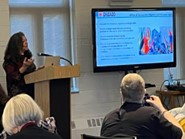
In 1985, Mayor Harold Washington issued an executive order prohibiting city employees from enforcing federal immigration laws and halting the City’s practice of asking job and driver’s license applicants about their citizenship status. Mayor Richard M. Daley reaffirmed Washington’s executive order, and the City Council voted it into law in 2006. In July 2012, Mayor Rahm Emanuel introduced the “Welcoming City” ordinance. The ordinance protects undocumented Chicago residents by restricting city agencies from cooperating and sharing information with federal immigration authorities. It prohibits Chicago police from questioning, arresting and prosecuting people solely on the suspicion that they are undocumented. The ordinance prevents the police from holding people in custody based on ICE warrants and detainer hold requests. The Welcoming City ordinance grants immigrants’ access to all city services, protects residents of all ages at school and work. City employees cannot ask people about their immigration status nor disclose that information to federal authorities.
TIn early November 2023, a group of Chicago aldermen proposed holding a referendum on the Welcoming City ordinance in March 2024. The two aldermen leading this proposal, a Latino and an African American, used the tactic of blaming the new arrivals transported by Gov. Greg Abbott, as evidence of the lack of the inequity historically experienced by most of our African American neighborhoods. While the Welcoming City ordinance speaks about “immigrants” and not asylum seekers, the aldermen triggered a reaction based on historical inequities that was expressed in negative words and behavior at a November 7 City Council meeting. This included Chicago police officers arresting a young immigrant advocate who had permission to speak at the meeting, preventing him from addressing the City Council.
The Illinois Coalition for Immigrant and Refugee Rights, an organization of more than 100 nonprofits that represent most of Illinois’ immigrant communities, organized the response to the Welcoming City ordinance challenge. The Diocese of Chicago is the only denomination that is an ICIRR member and is represented by the Sanctuary Task Force. We reached out to our diocese, asked Chicago residents to call and visit their alderpeople; participated in phone banks to voters; attended meetings of the City Council committees and general meetings. At its December 14 meeting, the City Council defeated the challenge to the Welcoming City ordinance. Thank you to everyone who was part of this movement in defense of the Welcoming City ordinance.
Although the challenge to the Welcoming City ordinance was defeated, the wound remains open. The basis for the anger of our African American neighbors is based on the historical inequity with which the City of Chicago has treated our brothers and sisters. As Mayor Harold Washington demonstrated in his mayoral campaigns and policies, we must work together in unity to deconstruct the city policies and ordinances that have resulted in these inequities. We must hold our leaders accountable. All Chicagoans have the right to live with dignity and justice.
